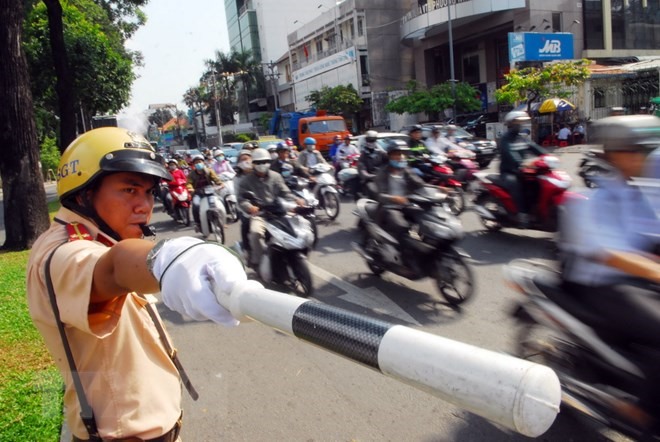 Society
Society

You’ve probably heard of multiple measures to ease traffic congestion in HCM City, but are you aware that the city plans to restrict motorbikes by 2030?
 |
| A police officer direct traffic in HCM City. — VNA/VNS Photo Mạnh Linh |
By An Phương
HCM CITY – You’ve probably heard of multiple measures to ease traffic congestion in HCM City, but are you aware that the city plans to restrict motorbikes by 2030?
As far as I know, HCM City is the third city, besides Hà Nội and Đà Nẵng, to come up with a roadmap to limit private vehicles travelling to the city centre and to areas prone to traffic congestion.
According to the proposal’s first phase from now until 2020, the city will increase parking fees, restrict parking for motorbikes and impose a toll on vehicles entering the city centre.
During peak hours between 7am and 7pm, motorbike travel will be restricted between Tân Bình District’s Trường Sơn Street and District 1’s Nguyễn Thị Minh Khai Street, and between Pasteur Street (Lý Tự Trọng – Điện Biên Phủ section) and Nam Kì Khởi Nghĩa Street (Điện Biên Phủ - Lý Tự Trọng section).
The city will also develop its bus network and encourage the use of buses over private vehicles, while continuing to expand pedestrian zones.
After 2020, as the metro system and a Bus Rapid Transit (BRT) continue to be developed, the city will limit the number of newly licensed private vehicles, according to authorities.
“I’m glad that motorbikes will not be banned, but only restricted,” Ngọc Hân, 35, told Việt Nam News. “The motorbike has always been a part of our culture, and it can’t be abandoned in a snap! Locals need time to get familiar with new modes of transport.”
“I’m concerned, however, about how motorbikes will be restricted. What will determine the restriction? Will it be their brand, the number of people on each vehicle, or what?” she asked.
Minh Hưng, 28, a close friend of mine, said that he had mixed feelings about the new proposal.
“I’m neither anti- nor pro- about this proposal. Even though I believe motorbike restriction will only help our city, I can’t quite figure how the current public transport or road infrastructure is capable of meeting travellers’ demand,” he said.
“Authorities have 12 years to achieve the target, which I’m not sure is realistic, considering what has already been done in Hà Nội,” he added.
Thanh Thuý, 22, had a slightly different opinion.
“Just think about having to walk a long distance under the heat or rain to get to a bus station, not to mention the exhausting waiting time before and during the ride. I can’t justify abandoning my motorbike,” Thuý said, adding that her close friend was once robbed on the bus and has been terrified ever since.
That being said, in addition to quality road infrastructure and accessible, widespread transportation, it is important to improve locals’ awareness of the importance of following traffic regulations and to encourage them to take public transport.
“But the entire to-do list has to be checked before moving on to restricting motorbikes,” Thuý added. And I agree.
According to an article in Sài Gòn Giải Phóng (Liberated Sài Gòn) newspaper, motorbikes will eventually be banned, whether locals like it or not, to make HCM City a smart and modern city in the region.
Among other tasks, the article suggested improving bus connectivity, installing parking lots near bus and train stations to enhance convenience, and permitting the construction of department stores and high-rises only in areas with spacious parking lots and efficient traffic connections.
As long as each area has what it takes to meet locals’ travel demands, it will be designated an area for motorbike restriction or a ban, according to the article.
In Bangkok, motorbikes were successfully banned as locals were offered public bicycles at stations set up at convenient spots along a total length of 365km of roads, the article noted.
In my view, Bangkok has much in common with HCM City in terms of small, narrow streets, so I think that plan might work out!
For me, it was a surprise to hear from people who said they were uncertain about the proposal but were glad that HCM City’s landscape was about to change.
“I’m doubtful that this proposal can actually ease traffic congestion, but it will surely make HCM City a more civilized, modern city,” Minh Hưng said. “Between the motorbike ban and restriction, I prefer the motorbike ban as it leaves people no choice but to commute via private cars and public transport.”
“Though restrictions may seem to be a safe option, which won’t cause much of a media controversy compared to a motorbike ban, it’s not an optimal solution,” Hưng added.
To be honest, I didn’t quite agree with Hưng, but as I had more time to process his rationale, I’ve come to accept that I will never abandon my motorbike unless I’m forced to.
This very much reminds me of more than 10 years ago when I had to switch from wearing a casual cap to a helmet.
All in all, the city will be free from motorbikes sooner or later, and what matters is how the authorities carry out their plan.
My friends and I would love to see a new Sài Gòn, but we can’t imagine our beloved city without motorbikes.
Cheers to the motorbike culture! – VNS